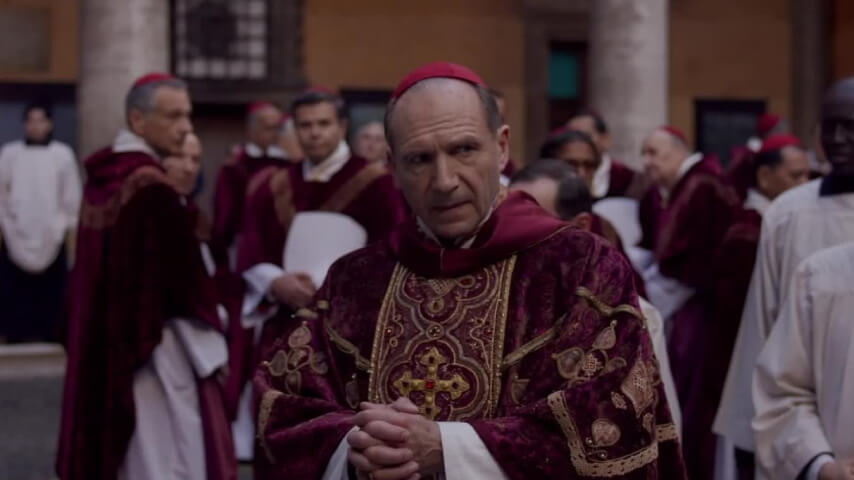Spoiler Space: The middlebrow soap of Conclave belies its complicated, left-field ending
The twisty airport papalback thrills culminate in a reveal the movie is ill-equipped to handle.
Photo: Focus Features
Spoiler Space offers thoughts on, and a place to discuss, the plot points we can’t disclose in our official review. Fair warning: This article features plot details of Conclave.
Conclave, the beautifully framed and oppressively scored film from All Quiet On The Western Front Oscar winner Edward Berger, could’ve been called Pope Detective. We all still would’ve watched something called Pope Detective and then the film itself would’ve been more honest about its pulpy plotting. Though the film is receiving considerable awards attention for being a respectable-looking ensemble drama for grown-ups, a rare enough designation to be sure, Conclave is also perfectly silly as it rolls out twist after twist. Literal bombshells drop upon a collection of Cardinals as they attempt to elect a new pope, each new scene of skullduggery or vote-whipping as lurid as any scheming episode of Game Of Thrones. But the final reveal, the big rug-pull that the film constantly telegraphs, is where Conclave actually gets interesting. Now that the film is streaming on Peacock, it’s worth diving fully into its goofy deep end.
After the sitting Pope dies of natural causes, the Church calls in all its Cardinals to figure out who’s going to take his place. Turns out, though, that a group of older Catholic men have some skeletons in their robe-filled closets! Enter Ralph Fiennes’ Thomas Lawrence, PI (Pope Investigator). Lawrence, presiding over the conclave, has his personal politics—more liberal-leaning than some of the one-dimensional reactionaries around him—but he’s mostly a good-hearted Columbo whose curiosity just keeps getting in the way. Bribery, secret children, photocopied evidence, and constant breaching of the sequestered voter’s info-bubble all contribute to the soapy camp of Conclave’s airport papalback story. Yet, around all this more conventional political drama lurks the spotlit mystery of Vincent Benitez (Carlos Diehz), whom the Pope made Archbishop of Kabul in secret.
From the moment he arrives, Benitez is near-silent, almost uncomfortably beatific, and obviously important to the film’s script. In a conclave dominated by brashly conservative African and European blocs composed of already-thin characters, the Mexican Benitez’s quietly progressive serenity can threaten to careen away from Christlike towards “enlightened minority” cartoonishness. Yet Diehz, an acting newcomer, shoulders this burden well, fleshing out the role with amused glances and earnest conviction. As Benitez acquires votes—slowly at first, then rapidly after making a defiant and loving speech about his experience in war zones—the only question remaining around Chekhov’s Cardinal is what, exactly, is going on with the hush-hush hospital visits he’d made.
Well, after Benitez has been chosen as the new pope, he gives Lawrence (and the audience) a final shock to chew on in Conclave’s closing minutes: Benitez is intersex, and had scheduled an affirming laparoscopic hysterectomy after discovering that he was born with a uterus and ovaries during an appendectomy. But Benitez had second thoughts and canceled the operation, coming to terms with his natural reality. This is summed, with incongruous pathos thanks to Diehz, in his statement to Lawrence: “I am as God made me.”
Despite its thematic ties to Lawrence’s push for doubt and uncertainty within the Church, which would (hopefully) humble an institution responsible for a whole lot of hate, this reveal—especially in the context of this unserious drama where you could set your watch to each new gotcha—is obviously staged as a lurid mic drop. That Benitez chooses to be known as Pope Innocent almost feels like an I Think You Should Leave bit. (“I didn’t rig shit!”)
With only a sequence or two between the reveal and the credits, Conclave can seem as disinterested in the idea of an intersex pope as it is in Benitez as a character. This feels especially true considering the broad, patronizing implication—after the film bonks us over the head with the patriarchal church and its long-suffering nuns—that this new pope is blessed with some sort of magical intersex enlightenment. This doesn’t seem to take into consideration that Benitez identifies as male, has identified this way his entire life, and that the possession of ovaries is in no way a guarantee of being politically/spiritually progressive. And yet, there is enough care in writer Peter Straughan’s adaptation of Robert Harris’ 2016 novel that it’s hard to fully dismiss this plot point as leering or prop-like.
The mere fact of Benitez getting the time to walk us through his thought process, from his self-discovery to his choice not to go through with the surgery, offers nuances around gender-affirming care that would feel novel even outside of a political landscape becoming increasingly hostile to it. Coupled with the reality that the majority of those seeking out Conclave are going to be in an older, potentially more conservative demographic (77% of audiences over age 35 and 44% over age 55, according to one report), and the relative dignity afforded Benitez—I mean, he ends up as the Pope, I guess!—seems like a net positive in terms of confronting audiences with an intersex character comfortable and secure in his own body.
Pushing past this symbolic surface and grappling with the film’s reality (is it a good thing that this version of the racist, homophobic, all-around bigoted Catholic Church names a Mexican intersex man as its leader?) is inherently unsatisfying. But it’s also hard not to see the silver lining in Conclave’s simplistically well-intentioned piece of provocation. At least Pope Detective didn’t start transvestigating anyone.